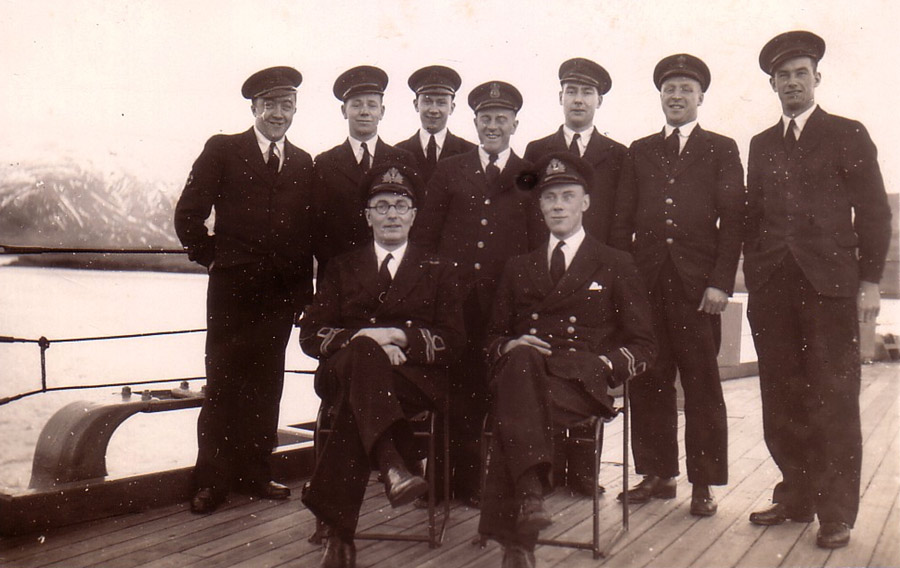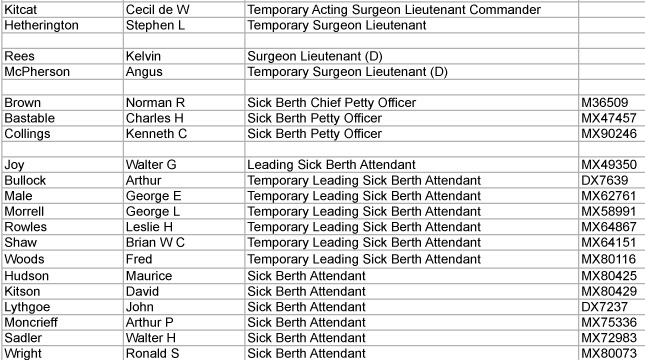







Some
of the sick bay team may have left at Glasgow during the refit.
Walter H. Sadler, Ronnie Wright, Maurice Hudson and Arthur Ching joined during the refit but Arthur was "a
supernumerary in the ship, a relief for casualties in the fleet".
Two
dental surgeons, Surgeon
Lt (D) K. Rees LDS and Surgeon Lt (D) A. McPherson RNVR LDS, joined HMS Hecla at Glasgow in January 1941 but they were members of the Dental Branch of the Royal Navy and not part of the Sick Bay team. Fred "Slinger" Woods in Australia, recalled the names of the SBA(D): "The
Dental Branch included LSBA (D) Arthur Bullock, LSBA (D),
Fred Woods, who worked with Surgeon McPherson. The other section of
the Dental branch was Dental Mechanic A. Moncrieff and PO Dental
Mechanic Brian Collings" (Lorraine Woods). Slinger Woods died after a fall in February 2018.
The medical staff and Sck Bay Attendants, including members of the Dental Branch, on the day HMS Hecla was torpedoed
This list is extracted ftom the complete crew list compiled by TNT Data Services from the Pay and Victualing Ledgers which can be downloaded as a PDF from this web site.

Arthur Ching described what happened on the night of the 11 November 1942:
"At 11 pm on the 11 November 1942 Hecla was struck by the
first of five torpedoes, in a boiler room beneath the sick Bay where
Brownie and I were sleeping, we immediately dressed and got the sick patients to the wardroom ante-room, after
this, two more torpedoes struck the ship, which cut off power to the
boat hoists. The captain gave the orders to "abandon ship", which
necessitated lowering of all the rafts etc with no lights; there was
bound to be some confusion and I believe that some people were struck
by falling life-rafts and sustained fatal injuries. My last sight of
Brownie was in the wardroom prior to 'abandon ship'."
George Male wrote in a letter to Kenneth Brown that:
"My
last memory of your Father is that late that night I was with him, the
Medical Officers and other Sick Berth Staff when we mustered aft
in the Quartermaster’s lobby. We had by then done what we could for two
men, badly burned, who had come up from the boiler room. I know your
Father got off the Ship but did not see him again."
Les Rowles described what happened in a letter to Bob Moore on the 12 February 1988:
“Our PMO Lt Cdr Kitcat told us to look after ourselves, so my pal and I slid down a rope into the drink and started to swim to Marne which had stopped to pick up survivors. We didn’t swim far as the Marne’s
stern was blown off before our eyes so Bernard and I thought we would
be best off on a raft. The raft was overladen and had people hanging on
to the sides. Every so often we would get tossed off and had to swim
back and every time we swam back there would be less of us as the night
passed. It was surprising how far people would drift from each other in
such a short time. We had little lights plugged into our lifebelts and
you could see them bobbing about in all directions, a sight never to be
forgotten. During the night a destroyer slid close to us; they threw us
a line, we missed it and she sped off much to our disappointment.
We were picked up by Venomous
about 1700 hours. I remember trying to climb aboard but slipping back;
someone said grab him and I was hauled aboard where I just flaked out.
When I came to our PO’s Officers’ Cook was standing over me looking
after my belt. He was very upset, he told me his mate, a young lad
named Moss [Brian C Moss, Cook(O), DM/X.70330] was gone. Also
around me were a couple of Venomous’
lads with a tot which was pushed down me, I had no choice; also a
cigarette and not forgetting the corn beef straight out of the tin with
fingers (not enough knives and forks to go round). It tasted good.”
Lt Cdr H.C.R. Alexander RN, the Navigating Officer on Hecla, witnessed the rescue of the Sick Bay Team by HMS Venomous: "When dawn came Venomous was busy picking up survivors, some still clinging to bits of timber, some dead, others lying on small planks, a very few on Carley floats of which the most heartwarming was the Sick Berth staff led by young Surgeon Lieutenant Hetherington, keeping stroke with their paddles and singing the 'Volga Boat Song' together with their wounded casualties".
The two officers and most of the Sick Berth Attendants survived including George Male, Kenneth Collings, Les Rowles, Fred ("Slinger") Woods, Monty Moncrieff (MX75336), Maurice Hudson (MX80425) plus the supernumerary, Petty Officer Arthur Ching. The two dentist, Surgeon Lt (D) K. Rees LDS and Surgeon Lt (D) A. McPherson RNVR LDS, also survived. George Leonard Morrell was born at Newton Abbot, Devon, in 1920 and joined Hecla on Christmas Day 1940 shortly before she was commissioned. Hecla was his first and last ship. After his rescue he was posted to HMS Drake
at Devonport and in November 1942 to the Royal Marine base at
Lympstone, Devon. He left the Navy as a Sick Berth CPO in 1961. His
sister married Edward (Eddie) Diggines (MX52889), a cook on Hecla.
Chief Pretty Officer Norman Brown(D/E.36509),
Leading Sick Berth Attendant William Brian Coulson Shaw
(D/KX.64151), known as Brian Shaw, SBA Ronald Wright (D/MX.80073) and
SBA Walter Sadler (D/MX.72983) died that night.
Brian Shaw stayed with the Roux family on their farm at Bainskloof in Western Cape on "uphomers" while Heclawas being repaired after detonating the mine on 15 May 1942. Louise Duncan sent me scans of the letters Brian Shaw wrote to her Mother Cynthia Roux and her Mother's letters to his parents, Edmund Coulson Shaw and Florence Hoskins Shaw, of Frodsham, Cheshire, after his death and in 2017 I was able to trace and return these letters to his family.
The
Principal Medical Officer (PMO), Surg.
Lt Cdr Cecil de Winton Kitcat RNVR (1900-67), had followed his two cousins,
brothers, into the Royal Navy. He retired as a Sen. Cons. Chest Phys. in
Somerset and lived at Nether Stowey. His
deputy, Surgeon
Lt Stephen Lonsdale Hetherington RNVR (1914-93), became
a GP in Caversham, Reading, and lived in Henley on Thames. Both his
son, Dr
Peter Hetherington, and grandson took up medicine as a profession but
were not called
upon to serve their country at sea in wartime.
Greg Clark, the "Schoolie", on HMS Hecla was the youngest officer when he joined her on Boxing Day 1940. After the war he became a Curator at the Royal Navy Museum in Portsmouth and wrote Doc: One Hundred Year History of the Sick Berth Branch which was published by the RN Museum in 1984. Although out of print copies can be found on the Internet.